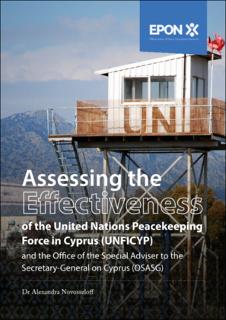| dc.contributor.author | Novosseloff, Alexandra | |
| dc.contributor.editor | Coning, Cedric Hattingh de | |
| dc.date.accessioned | 2022-06-20T08:49:17Z | |
| dc.date.available | 2022-06-20T08:49:17Z | |
| dc.date.created | 2022-05-27T13:01:23Z | |
| dc.date.issued | 2021 | |
| dc.identifier.isbn | 978-82-7002-351-6 | |
| dc.identifier.uri | https://hdl.handle.net/11250/2999483 | |
| dc.description.abstract | This report assesses the extent to which the UN Peacekeeping Force in Cyprus (UNFICYP) along with the Office of the Special Adviser to the Secretary- General on Cyprus (OSASG) – also called the mission of the Good Offices – is achieving its mandate enshrined in Resolution 164 of March 1964. In 2024, the UN Missions in Cyprus will celebrate the 60th anniversary of their presence in the country, and it seems timely to analyse their impact and effectiveness over the years. The EPON report looks for the first time at what the peacekeeping research community has called “legacy operations”, those born during the Cold War and still in place today. UNFICYP is the eighth peacekeeping mission created since 1948. The report looks also at the interaction between peacekeeping and peacemaking in the context of a frozen conflict, often referred to by researchers and scholars as the “Cyprus problem”. Cyprus is a unique case in international relations and peace operations. Its capital city is the only remaining divided capital in Europe and in the world. Cyprus is the only country in the world to have “Guarantors” with a right to intervene and station troops on a permanent basis. The report acknowledges the role of prevention of UNFICYP to the extent that the people in Cyprus tend to forget that no cease-fire agreement exists between the parties. Peacekeeping has been successful at creating a comfortable status quo that peacemaking has yet been unable to break down. In this context, the lack of will from the parties to engage in a meaningful political process has limited the UN’s effectiveness. | en_US |
| dc.description.abstract | Assessing the Effectiveness of the United Nations Peacekeeping Force in Cyprus (UNFICYP) and The Office of the Special Adviser to the Secretary- General on Cyprus (OSASG) | en_US |
| dc.language.iso | eng | en_US |
| dc.publisher | NUPI | en_US |
| dc.relation.ispartofseries | EPON Report; | |
| dc.relation.uri | https://effectivepeaceops.net/wp-content/uploads/2021/10/EPON-Cyprus-Report.pdf | |
| dc.subject | Europa | en_US |
| dc.subject | Europe | en_US |
| dc.subject | Internasjonale organisasjoner | en_US |
| dc.subject | International Organisations | en_US |
| dc.subject | Fredsoperasjoner | en_US |
| dc.subject | Peace operations | en_US |
| dc.subject | Konflikt | en_US |
| dc.subject | Conflict resolution | en_US |
| dc.title | Assessing the Effectiveness of the United Nations Peacekeeping Force in Cyprus (UNFICYP) and The Office of the Special Adviser to the Secretary- General on Cyprus (OSASG) | en_US |
| dc.title.alternative | Assessing the Effectiveness of the United Nations Peacekeeping Force in Cyprus (UNFICYP) and The Office of the Special Adviser to the Secretary- General on Cyprus (OSASG) | en_US |
| dc.type | Research report | en_US |
| dc.description.version | publishedVersion | en_US |
| dc.subject.nsi | VDP::Internasjonal politikk: 243 | en_US |
| dc.subject.nsi | VDP::International politics: 243 | en_US |
| dc.source.pagenumber | 214 | en_US |
| dc.identifier.cristin | 2027709 | |
| dc.relation.project | Norges forskningsråd: 288363 | en_US |
| cristin.ispublished | true | |
| cristin.fulltext | original | |
